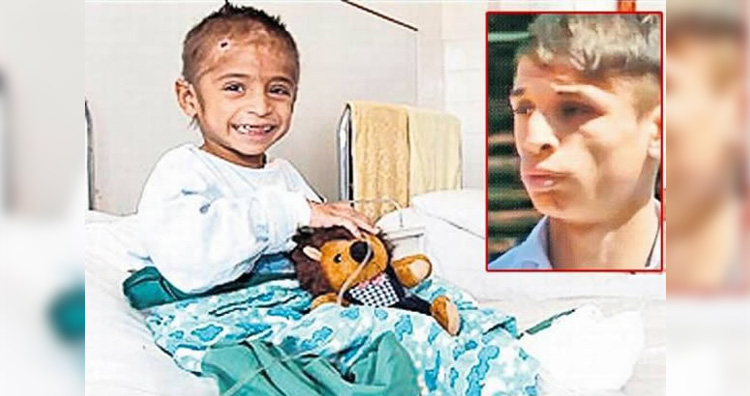
Many people believe that feral children exist solely in fairytales and myths. They may be rare. but feral children are, in fact, real. There have been more than 100 documented cases of kids raised by animals and living in the wild, all by themselves. Being away from human civilization for so long and responding to the necessity to survive in the wild, these feral children have adopted traits of animals in the woods. We bring to you 10 such fascinating stories of kids who have broken the shackles of what we consider normal and have managed to survive in the wild.
1. Marina Chapman was just four years old during her kidnapping in 1954. Her kidnappers left her in the jungle where she grew amidst a family of capuchin monkeys.She ate berries, roots, and bananas dropped by the monkeys, slept in holes in trees, and walked on all fours like the monkeys.
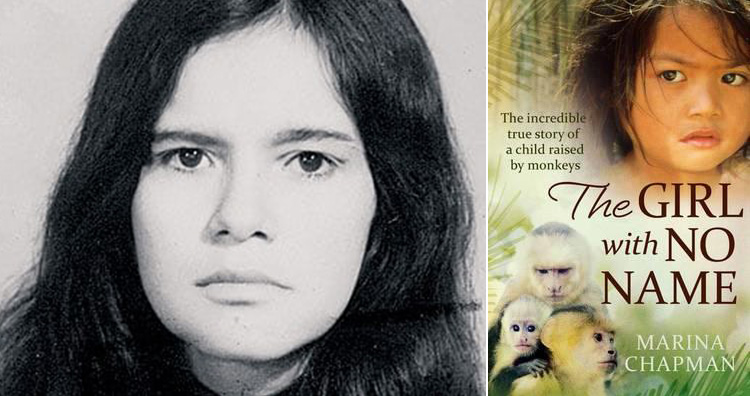
Marina Chapman was born in approximately 1950. When she was just four years old, she was taken from her village. Her kidnappers must have changed their minds in the middle of their act and left Marina deep in the Colombian jungle. She befriended a group of capuchin monkeys and grew up with them.
Marina learned to fend for herself. She started observing the monkeys and noticed that if she stood under the trees where the monkeys were eating, she could pick up the food dropped by them. Marina slept in holes in the trees and walked on all fours like the monkeys. She spent around five years in the wild. She lost her language completely by the time hunters rescued her. According to Chapman, she was later sold to a brothel in Cúcuta. She escaped from the brothel and then lived on the streets. After that, she became a slave in a mafia family.
A neighbor saved her, and she eventually moved to Bradford, Yorkshire where she currently resides with her family. Chapman went on to write her life story in her book The Girl With No Name but faced problems finding a publisher as nobody was ready to believe her story. They raised questions about her authenticity and memory.
In her book, she described numerous instances in which elderly monkeys came to her aid. Once she got terrible food poisoning by eating tamarind and was at risk of losing her life. She was crying in agony when an elderly monkey, whom she calls “Grandpa” now, led her to muddy waters. Marina drank the water, vomited, and started to recover.
2. Bello’s parents abandoned him when he was just six months old. A family of chimps adopted and raised him. At the time of his rescue, he was around the age of two. Bello walked using his legs but dragged his arms on the ground like a chimpanzee. He would leap about shrieking like an ape.
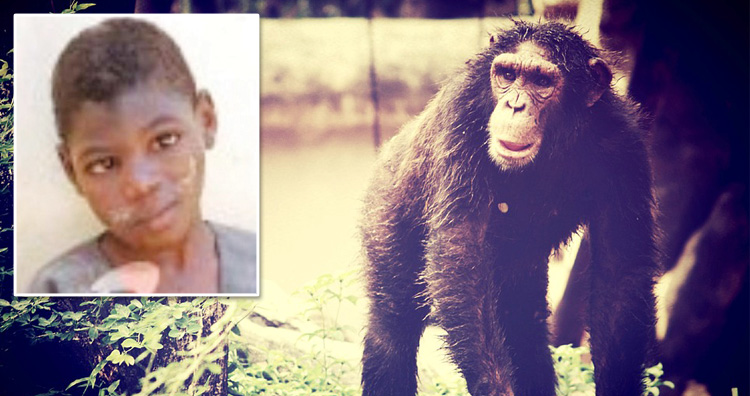
In 1996, there was a rescue of a disabled Nigerian boy from the wild. He was placed in the care of a specialist children’s home. The nursing staff of the Tudun Maliki Torrey home in Kano named the boy “Bello.” Before being rescued, hunters found Bello with a family of chimpanzees in the Falgore Forest which is 150 kilometers south of Kano.
At the time of his rescue, Bello would have been around two years old. Bello might have been the child of nomadic, ethnic Fulani people who travel through the region. He is both mentally and physically challenged. Officials believe that it was his disabilities that led to the abandonment. He had a misshapen forehead, sloping right shoulder, and protruding chest. Abandonment of disabled children is common among the Fulani people. But Bello was lucky that the chimpanzee family adopted him.
Abba Isa Muhammad, Bello’s welfare officer, estimates that Bello might have been only six months old when the chimpanzees adopted him. When Bello came to the care home, he was about the size and weight of a four-year-old. Bello walked in a chimpanzee-like style, moving on his hind legs and dragging his arms on the ground. He cups and claps his hands over his head repeatedly just the way monkeys do. Bello does not speak but makes noises like chimpanzees.
3. Dina Sanichar emerged from a wolf’s cave in 1867. He initially exhibited all the habits of a wild animal, tearing off any clothes, eating food from the ground, and walking on all fours. Dina was eventually weaned off raw meat onto cooked food but never did learn to speak.
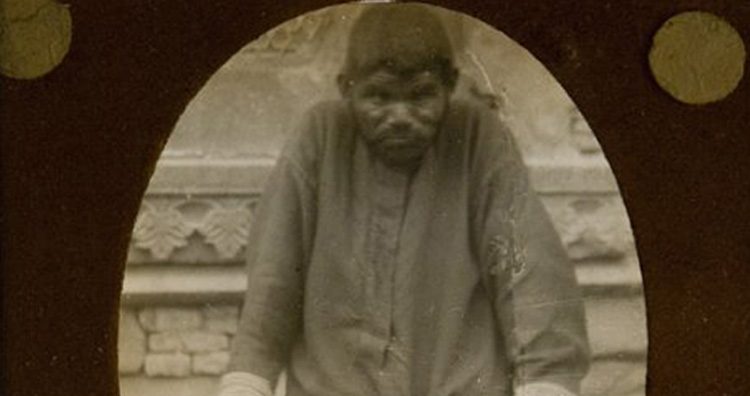
In 1867, hunters rescued a young boy from the Bulandshahr Forest in India. Hunters saw a young, human-like child following a pack of wolves into a cave. He was running on all fours like the wolves. The hunters killed the wolves and found the boy sleeping inside the cave. At the time of his rescue from the wolves, he was estimated to be about six years old.
He exhibited many animal behaviors during his stay at an orphanage in Sekandra. He had the habit of gnawing on bones to sharpen his teeth. Dina refused all attempts to clothe him, simply tearing anything that was put on him. He remained in human company for about 20 years before he died. But all he managed to learn was to stand straight, dress up (with difficulty), and look after his own cup and plate. He never learned to speak.
He also preferred to eat raw meat as opposed to cooked food. Dina took to heavy smoking and suffered from tuberculosis. He died in 1895.
4. Ramu was an Indian boy found to be living in a forest in India. A pack of wolves raised the boy. His skin was very dark, and he had sharpened teeth, long hooked fingernails, matted hair, and calluses on his palms, elbows, and knees. He was fond of chicken-hunting, would eat earth, and had a craving for blood.
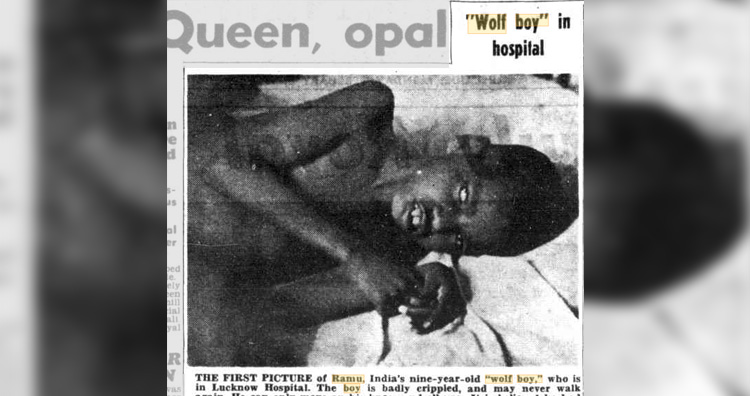
Ramu must have been around five years old at the time of his rescue from the jungles of Uttar Pradesh. He was found in the company of wolf cubs. Ramu did not drink water like humans but instead, lapped it up like dogs do. He preferred raw meat to cooked food. Ramu walked on all fours when he was found and had scars all over his body.
The sisters at Prem Nivas, a home for the destitute run by Mother Teresa’s Missionaries of Charity, took him under their care. They claimed that he had matted hair and claw-like nails. Although he learned to bathe and clothe himself under the care of the sisters, he never learned to speak. He would sneak out at night and raid the chicken coops.
According to Dr. D.N. Sharma, considering Ramu’s characteristics it was clear that he had been raised by animals, especially wolves, as they are very common in Uttar Pradesh. Dr. D.N. Sharma is the former director of the Balrampur Hospital where Ramu’s treatment commenced after his rescue.
He died in the early ’60s.
5. John Ssebunya lived with monkeys for three years in the African jungle following his abandonment. Upon his capture in 1991, he had calluses on his knees from walking like a monkey. When villagers tried to capture him, his monkey guardians put up a ferocious fight and tried to protect him from being taken.
John’s abandonment in the jungles was due to the murder of his mother in 1988. Officials believe that his father died in the civil unrest in Uganda in the early ’90s. A colony of African green monkeys came across the abandoned three-year-old and adopted him as one of their own. John learned their mannerisms, became adept at climbing trees and lived on a diet of fruits, nuts, and berries for the next three years.
In 1991, a tribeswoman saw John scavenging for food along with the monkeys. She reported it to the people in her village. John, terrified when the villagers found him, hurled sticks at them. He tried to hide up a tree to avoid being taken away. His family of monkeys also put up a ferocious fight against the villagers and tried to protect the boy from taken away.
The manager of the Kamuzinda Christian Orphanage took John in. He lived with the family of the orphanage manager. There, he learned to speak and took up other human ways. When he began to utter his first words, the orphanage found out that he had a fine singing voice. In 1999, he was part of a children’s choir singing tour.
6. Marcos Rodríguez Pantoja lived for 12 years with wolves since the time he was seven years old. The members of Spain’s Guardia Civil captured him and returned to human civilization when he was 19 years old. Marcos never truly adapted to the civilized world and he dreamt frequently about going back to live among the wolves.
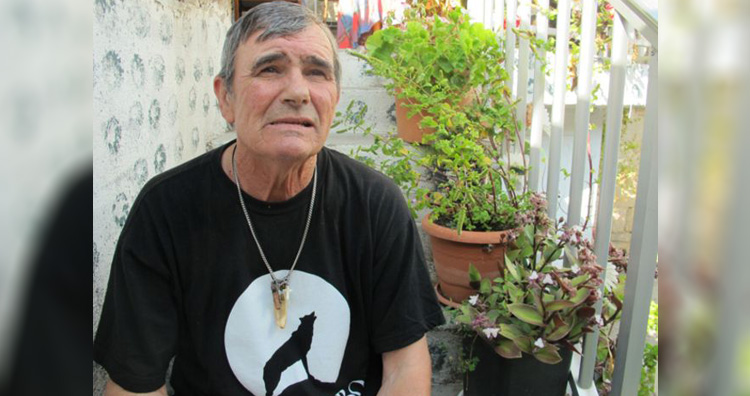
Marcos Rodriguez Pantoja belonged to a poor family. He was only seven when his father sold him to a goat shepherd that lived in the isolated Sierra Morena. The man who bought Marcos used to live in a cave. He taught Marcos how to herd the goats as well as how to care for himself while surviving in the wilderness.
The shepherd died soon after, and Marcos was left all alone. But because of the teachings of the shepherd, he was able to cope with the environment. He lived in the mountains for 12 years, from 1953 to 1965. Marcos had no human contact and made friends with a small pack of wolves.
The members of Spain’s Guardia Civil captured him and brought him back to human civilization when he was 19. Marcos never truly adapted to the human world and wished he could go back to his family of wolves. In 2007, Director Olivares discovered the boy’s fascinating story. He tracked down Marcos who lived in the town of Orense in the region of Galicia and sought his help on the story.
For the next two years, Marcos cooperated with the director on the filming of his amazing story. He even appears in the last scene of the movie, Among Wolves, happily playing with a wolf.
7. Andrei Tolstyk’s parents abandoned him when he was just three months old. Their family dog raised Andrei for seven years. Deprived of human contact for so long,Andrei could not talk and had adopted many dog-like traits including walking on all fours, biting people, sniffing his food before he ate it, and general feral behavior.
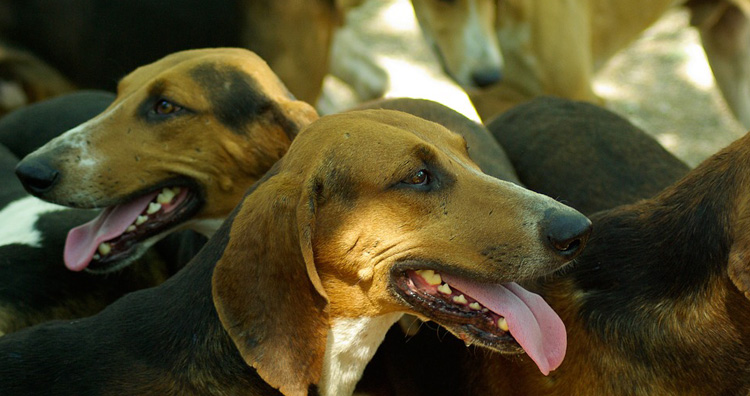
Andrei, a Siberian boy, has been raised by a dog since he was three months old. He was found living in a remote part of Siberia seven years after he was abandoned by his parents. The house he lived in was in such a remote location that the absence of his parents went unnoticed by the few other inhabitants. His rescue took place when social workers were trying to figure out why he had not enrolled in the local school.
Deprived of human contact for nearly seven years, Andrei was unable to talk. She also adopted several dog-like traits. He was afraid of people at the orphan center that took him in. He behaved aggressively and sniffed all his food before eating it. In about two weeks, he learned to walk on his feet and even use a spoon. He communicated through basic sign language.
8. Ivan Mishukov, a boy from Moscow, lived with a pack of dogs for two years. After running away from home, he took to begging and won the dogs’ trust by offering them scraps of food. In return, they protected him from the cold and from ill-wishers and made him their pack leader.
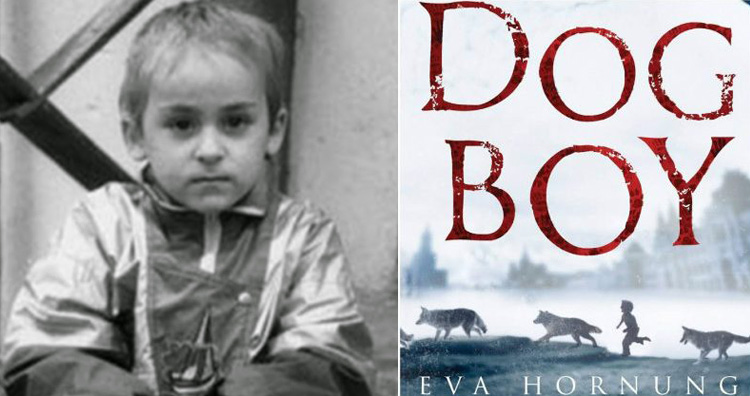
In 1998, police rescued Ivan Mishukov near Moscow. Then aged six, he was found living with a pack of wild dogs for the past two years. Ivan had left his family when he was just four years old to get away from his mother and her abusive alcoholic boyfriend.
Out on the streets, he took to begging. Slowly he earned the dogs’ trust by offering them scraps of food. In return, they protected him from the cold and from ill-wishers. Eventually, they made him their pack leader. The police had a hard time separating the boy from the dogs. They managed by leaving bait for the pack in a restaurant kitchen. Prior to the capture, Ivan escaped the police three times with the help of his pack.
Ivan was able to easily relearn his language and could talk fluently. He studied in military school and served in the Russian Army. His fascinating story caught the attention of Australian writer Eva Hornung. Her novel Dog Boy (2009) is based on many of the same elements of Ivan’s story.
9. Ehsaas, better known as “Mowgli girl“, used to live with monkeys in the Katarniaghat Wildlife Sanctuary. She walked on all fours, had no language skills, ate directly with her mouth rather than using her hands, and was afraid of people. She has tried to repeatedly to escape hospital confinement and is prone to outbursts of anger and violence.
One of the most recent cases of kids being raised by animals took place last April in Uttar Pradesh, India. An eight-year-old girl was found living among monkeys at Katarniaghat Wildlife Sanctuary. She was unable to walk or talk like a human being and has been dubbed the real-life “Mowgli girl.”
During the rescue by police, the apes screeched at them (so did she) and tried to protect her from being taken. She is prone to bouts of anger and violence and faces problems when in the proximity of a human. Although she has shown some improvement and the people at the Nirvan Center where she currently resides are teaching her to walk on two legs, it has been reported that she continues to walk on all fours.
10. Traian Caldarar lived for three years with wild dogs in the wilderness. When rescued, he was barely alive huddled in a cardboard box, naked, and the size of a three-year-old. He was suffering from severe malnutrition and rickets and his circulation was bad. He became violent when hungry and preferred to sleep under his bed.

In 2002, a shepherd rescued Traian Caldarar from the Transylvanian forests. He was barely alive when he was rescued. He was found near the body of a dog which the boy had apparently been eating. The boy had dark skin, flared nostrils, and downy brown hair. His movements were animalistic.
He was suffering from severe malnutrition and rickets at the time of his rescue. Aged seven, he was the size of a three-year-old. His blood circulation was not good, possibly because of an earlier frostbite. He became violent when hungry and preferred to sleep under his bed. He desperately defended his food and growled for another plate before finishing the one in his hands. But two months after his rescue, he learned to share sweets with other children.
His mother recognized him from television reports and took him home when the authorities ruled his mother fit to look after him. Although Traian is making progress, he is unable to communicate with words. He just remembers a few words like Lina, his mother’s name, and the word “mum.” According to doctors, Traian is making good progress healthwise.







No comments:
Post a Comment